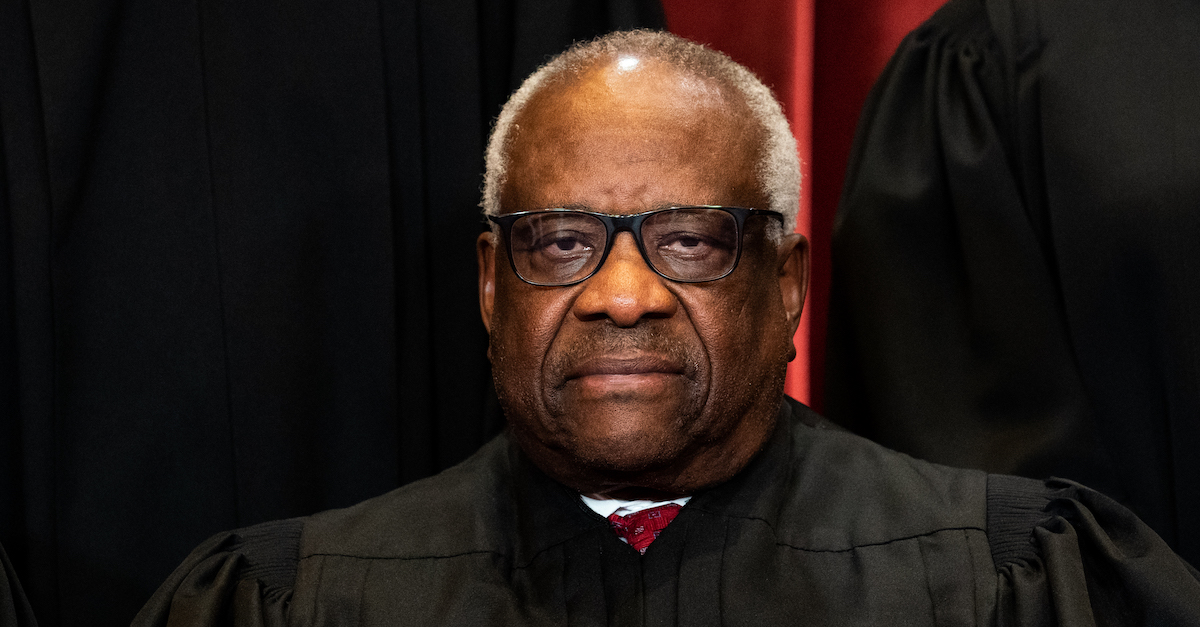
Associate Justice Clarence Thomas sits during a group photo of the Justices at the Supreme Court in Washington, D.C on April 23, 2021. (Photo by Erin Schaff/Pool/Getty Images.)
In a lone opinion on Tuesday, the U.S. Supreme Court jettisoned as moot a case brought by a Maine-based hotel operator over a woman’s serial lawsuits to address Americans with Disabilities Act (ADA) violations. If Justice Clarence Thomas had his way, though, the Supreme Court would have resolved a circuit split and found that Deborah Laufer, a wheelchair-bound Floridian scouring hotel websites across the internet to find deficiencies in disability accessibility info, lacked standing to sue Acheson Hotels, LLC in the first place.
Justice Amy Coney Barrett penned the opinion of the Supreme Court and was joined by her colleagues, though Justices Kentanji Brown Jackson and Thomas made sure to write separately concurring in the judgment.
The Barrett-led justices, rather than ruling against Laufer for lack of standing, vacated the judgment of the U.S. Court of Appeals for the First Circuit that had found Laufer to be a “tester” with standing under under the Fair Housing Act.
When the case arose, this was the question presented:
Does a self-appointed Americans with Disabilities Act “tester” have Article III standing to challenge a place of public accommodation’s failure to provide disability accessibility information on its website, even if she lacks any intention of visiting that place of public accommodation?
The Supreme Court ultimately opted not to resolve that question.
“The judgment is vacated, and the case is remanded to the United States Court of Appeals for the First Circuit with instructions to dismiss the case as moot,” Barrett wrote.
Barrett noted earlier that Laufer has “singlehandedly generated a circuit split” between the six of the circuit courts — “The Second, Fifth, and Tenth Circuits have held that she lacks standing; the First, Fourth, and Eleventh Circuits have held that she has it.”
While acknowledging that the Supreme Court took up the case First Circuit case to begin with in order to resolve the circuit split, the case “took an unusual turn” over the summer, when attorney misconduct issues arose and Laufer dismissed her own cases [citations removed for ease of reading]:
After we granted review, the case took an unusual turn. In July, the United States District Court for the District of Maryland suspended Laufer’s lawyer, Tristan Gillespie, from the practice of law for defrauding hotels by lying in fee petitions and during settlement negotiations. It based the suspension on a report finding that Gillespie demanded $10,000 in attorney’s fees per case even though he used “boilerplate complaints.” In addition, Gillespie funneled six-figure sums to the father of Laufer’s grandchild for investigatory work that he never performed, raising the prospect that either Gillespie or Laufer (or both) got a cut of the money. Making matters still worse, the sanctions order against Gillespie also implicated Laufer’s former counsel of record before this Court, Thomas Bacon.
After that, Barrett wrote, Laufer voluntarily tossed out “her pending suits with prejudice, including her complaint against Acheson in the District of Maine,” and argued in favor of mooting the case.
Though Barrett et al. were “sensitive to Acheson’s concern about litigants manipulating the jurisdiction of this Court,” the justices were “not convinced, however, that Laufer abandoned her case in an effort to evade our review” — that is, the justices not named Clarence Thomas.
Thomas warned that SCOTUS‘ refusal to decide the question before the justices “needlessly invited” others to imitate Laufer’s filing of “hundreds of lawsuits against hotels she has no intention of visiting.” Laufer would typically offer to “settle immediately for $10,000 in attorney’s fees and corrective action” for hotel websites that “lack accessibility information mandated by a federal regulation,” the conservative justice continued.
“I would not reward Laufer’s transparent tactic for evading our review,” Thomas wrote separately. “Although the majority leaves the door open to ‘exercise [its] discretion differently in a future case,’ we have needlessly invited litigants to follow Laufer’s path to manipulate our docket. We should not resolve this case about standing based upon mootness of Laufer’s own making.”
Clarence Thomas summed up the case and his complaint about it this way:
Deborah Laufer has filed hundreds of lawsuits against hotels she has no intention of visiting, claiming that their websites lack accessibility information mandated by a federal regulation. At both parties’ request, this Court agreed to answer a question that has divided the Courts of Appeals: whether plaintiffs like Laufer have standing to bring these claims. The Court decides not to decide that question because, after briefing began, Laufer voluntarily dismissed her claim in the District Court. I would answer this important and recurring question, which, as all agree, we have the authority to do. And, I conclude that Laufer lacks standing.
Thomas explained that Laufer lacks standing because, in his view, the ADA “prohibits only discrimination based on disability — it does not create a right to information.” He also jabbed again at Lauder’s “eleventh-hour” dismissal.
“Standing ensures that courts decide disputes over violations of a person’s rights, not a defendant’s compliance with the law in the abstract. Because Laufer has not asserted a violation of a right owed to her, she has no standing to bring her Reservation Rule claims,” he concluded. “The Court should not have avoided reaching that conclusion due to Laufer’s eleventh-hour tactics.”
Read the opinions here.
Have a tip we should know? [email protected]

